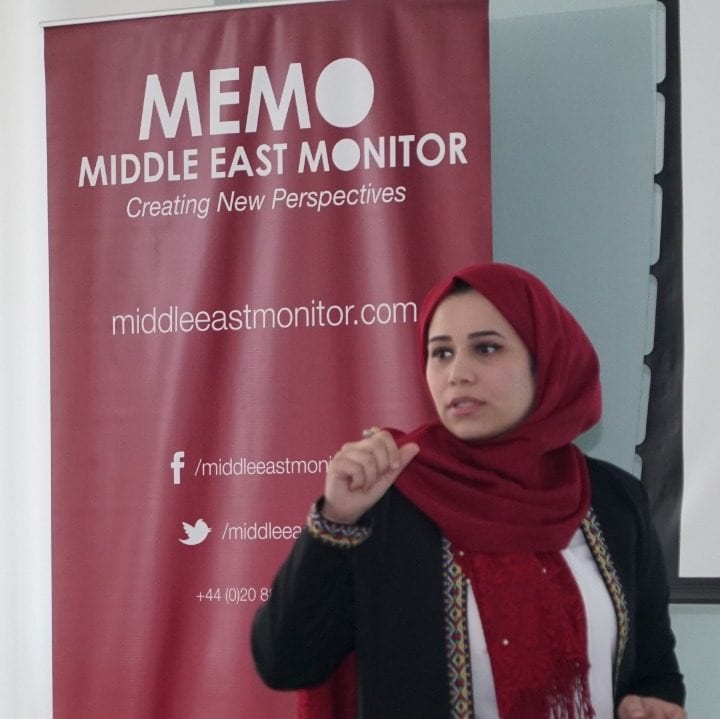Seventy-four years since the Palestinian Nakba, Abder Raouf Misleh still clings to the hope that he will return to the village from where he was displaced in 1948. His memory is fresh about the details of the ethnic cleansing and what the nascent Israeli occupation forces did to his village and his family.
“I remember it as if it were yesterday,” Misleh told me. “I remember when Israeli forces entered my village when I was about 12 years old. My village had a mosque and it had only one corner where a lot of people always gathered at the end of day to talk and exchange ideas. At around five or six o’clock, the Israeli forces bombed that corner and killed more than 38 people.”
The survivors ran away to the next village. “We thought that we would go back the next day when the bombing would be over, but we have never gone back. I can’t forget the face of my father. He was crying like a child, and shouting, ‘My house, my house, one day I will come back.’ We kept walking until we arrived in Balaa. We left with nothing; nothing at all.”
Abder Raouf Misleh is 87 years old and has lived in Brazil since 1956. His village of Kakun near Tulkarem had a population of 2,000 when it was attacked and they were driven out in 1948. Kakun was one of more than 500 villages destroyed by the Israeli occupation forces during and since the Nakba. Misleh and his family were among the 800,000 Palestinians who were ethnically cleansed in 1948. He had 11 siblings and they were displaced across many countries.
READ: The colonial lie celebrating 74 years of forgery and land theft
“Two of my brothers were wounded; one of them lost an ear; another was wounded in the spine. One was detained for six months in a town 11km away from the village. He died three months after he was released by the Israelis.”
Misleh has always dreamed about returning to Palestine, but like many other refugees he didn’t take Brazilian citizenship because he thought that he might lose his Palestinian nationality if he did. “After my father passed way, two of my brothers came to Brazil and then I came in order to work, get money and send it to our family. I went to Brazil with only $10 in my pocket and a small suitcase. It took 12 days by ship.”
In Brazil, he sold clothes door to door, and trained as a carpenter. He and his Palestinian-Brazilian wife — they married in 1964 — have two daughters and five grandchildren.
READ: The strategic importance of the Palestinians in Israel in any upcoming war
“My plan was to return to Palestine in a few years, but I couldn’t. No one has ever returned. I could not return to my village, and I did not obtain a foreign passport that would enable me to enter Palestine after that. I worked here and started a family. My daughter Soraya, though, has continued my journey through her writing.”
Soraya Misleh is one of the most prominent Palestinian activists in Brazil and Latin America. She is a member of the Brazilian Press Union and the Coordination Committee of the Front for the Defence of the Palestinian People, and is also an activist in Brazil’s Boycott, Divestment and Sanctions (BDS) movement. She has written a two-volume book about the Nakba; her Master’s degree told the story of her father’s village. She also has a PhD from the University of Sao Paulo (USP) on the History of Palestinian Women; it has been recommended for publication. She has visited Palestine and the place where her father´s village used to be. Her father is very happy that she was able to do this. “My daughter went to Palestine and represented me there. She is part of my life; it is the truth of destiny.”
Every year, on 15 May, 12.4 million Palestinians around the world commemorate the Nakba as they continue to struggle for their legitimate right to return to their homeland. In Brazil, Nakba Day is synonymous with the Palestinian refugee Abder Raouf Misleh who fled from his village and lives in Brazil. He would go to his homeland tomorrow if he could. “That is my wish,” he added.
READ: Israel ‘tortures Palestinian children in detention’
The views expressed in this article belong to the author and do not necessarily reflect the editorial policy of Middle East Monitor.

![Abder Raouf Misleh with his family in Brazil [Abder Raouf Misleh]](https://i0.wp.com/www.middleeastmonitor.com/wp-content/uploads/2022/05/1-2.jpg?fit=920%2C613&ssl=1)

![[Abder Raouf Misleh]](https://i0.wp.com/www.middleeastmonitor.com/wp-content/uploads/2022/05/2-1.jpg?w=361&h=390&ssl=1)
![[Abder Raouf Misleh]](https://i0.wp.com/www.middleeastmonitor.com/wp-content/uploads/2022/05/1-1.jpg?w=551&h=390&ssl=1)
![[Abder Raouf Misleh]](https://i0.wp.com/www.middleeastmonitor.com/wp-content/uploads/2022/05/3-1.jpg?w=354&h=266&ssl=1)
![[Abder Raouf Misleh]](https://i0.wp.com/www.middleeastmonitor.com/wp-content/uploads/2022/05/5.jpg?w=200&h=266&ssl=1)
![[Abder Raouf Misleh]](https://i0.wp.com/www.middleeastmonitor.com/wp-content/uploads/2022/05/4.jpg?w=354&h=266&ssl=1)
![[Abder Raouf Misleh]](https://i0.wp.com/www.middleeastmonitor.com/wp-content/uploads/2022/05/6.jpg?w=641&h=361&ssl=1)
![[Abder Raouf Misleh]](https://i0.wp.com/www.middleeastmonitor.com/wp-content/uploads/2022/05/8.jpg?w=271&h=361&ssl=1)
![[Abder Raouf Misleh]](https://i0.wp.com/www.middleeastmonitor.com/wp-content/uploads/2022/05/7.jpg?w=916&h=1221&ssl=1)






